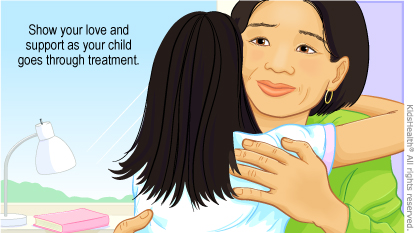Eating Disorder: How to Care for Your Child
Eating disorders are problems with the way people eat. They can harm a child's health, emotions, and relationships. Treatment for eating disorders can help a child have a healthy weight, develop healthy habits, and change the way they think about food and their body.


-
Get help early. When an eating disorder is caught early, a person has a better chance of recovery. Make an appointment with your child's doctor or an eating disorders specialist.
-
Talk to your child about your concerns. Be calm, direct, and caring. Let them know you will help. Ask them to tell you what it's like for them.
-
Go to all medical and care visits. Treatment takes time and effort. Work with the care team to get the help your child needs. Ask questions any time you have them.
-
Be patient and supportive. Learn what you can do to help your child. Try to keep your relationship with your child strong and positive. Make time to listen, talk, and do things that you both enjoy.
-
Focus on a healthy lifestyle. Encourage everyone in your family to be active every day and eat a healthy diet. Help your child get enough sleep. Find ways to manage stress and improve mood. Your child might enjoy listening to music, drawing, dancing, writing in a journal, or talking to a friend. Yoga, meditation, or taking a couple of deep breaths also can help your child relax.
-
Help your child have a healthy body image. Be a role model. Don't criticize your own or other people's weight, body, or looks. Talk about bodies in positive ways. Avoid talking about weight.


Your child:
-
is lightheaded or dizzy, or faints
-
appears dehydrated; signs include dizziness, drowsiness, a dry or sticky mouth, sunken eyes, or making less pee or darker than usual pee
-
has trouble breathing, chest pain, or an irregular heartbeat
-
has a seizure
If you are worried that your child may try to commit suicide (end their life) or they have talked about a specific plan for suicide, take your child to the ER.
You or your child also can call or text the National Suicide Prevention Lifeline at 988.

What are the different types of eating disorders? There are many types of eating disorders, including:
-
Anorexia: Kids with anorexia have an intense fear of weight gain. They eat very little on purpose. This leads to a very low body weight.
-
Bulimia: Kids with bulimia have an extreme fear of weight gain. They binge eat (eat lots of food, even after they are full), sometimes in private so other people don't see how much they eat. They also use unhealthy behaviors to prevent weight gain, such as throwing up, misusing laxatives and other medicines, fasting (not eating for a long period of time), or excessive exercise.
-
Binge eating disorder: Kids with binge eating disorder overeat and feel out of control and unable to stop eating. They eat large amounts of food even when they're not hungry. They may feel upset or guilty after binge eating and often gain weight and become very overweight. Unlike bulimia, kids with binge eating disorder do not make themselves throw up, use laxatives, or exercise a lot to make up for eating too much.
-
Avoidant/restrictive food intake disorder (ARFID): Kids with ARFID are not interested in foods or avoid foods. Kids with ARFID aren't afraid of gaining weight and they don't have a poor body image. They do not eat because they are turned off by the smell, taste, texture, or color of food. Some may have choked on food and are afraid it will happen again. Many kids with ARFID are underweight or do not gain weight as expected. But others are normal weight or overweight, especially if they eat only junk foods.
How are eating disorders treated? A care team of specialists treat people who have an eating disorder. The team can include doctors, behavioral health providers, and a dietitian. These experts work together to monitor the child's medical health, provide counseling, and make dietary recommendations.
Some kids can be treated at home with close follow-up with the care team. Others may go to a special program during the day to get help. Some kids need to stay in the hospital to make sure they get the treatment they need.